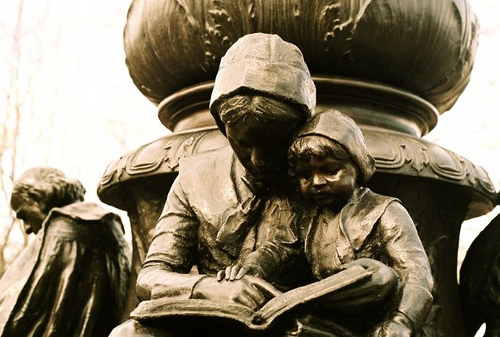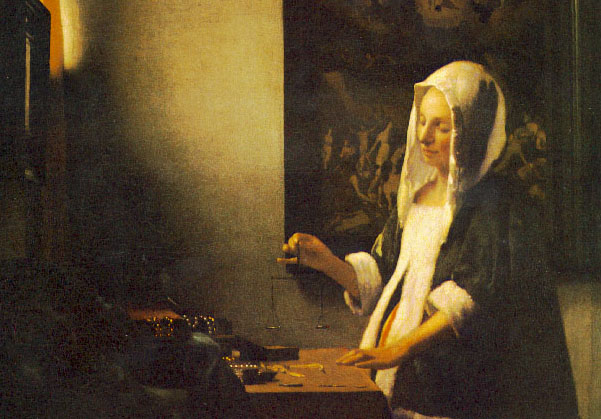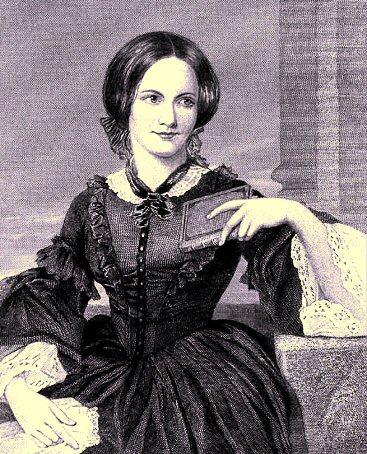“Verses upon the Burning of our House, July 10, 1666” (sometimes attributed a longer title: “Here Follows Some Verses Upon the Burning of Our house, July 10th. 1666. Copied Out of a Loose Paper.”) by Anne Bradstreet is a poem written in couplets in iambic tetrameter. The rhyme scheme is “aa bb cc…” This is a common rhyme scheme for Bradstreet.
A couplet is a two-line set in a poem. Each line is a complete phrase or sentence, and each couplet typically frames a single idea. Iambic describes a way to write and read poetry according to stressed and unstressed syllables. An iamb is a unit of poetic meter, or a foot, consisting of one unstressed syllable followed by one stressed syllable. Several types of metric substitutions are employed in iambic poetry, but the iamb is the root and by far the most common. Tetrameter refers to the number of feet in a line of poetry—in this case, four. Bradstreet wrote in iambic meter, usually in pentameter (five feet), but sometimes in tetrameter. Edmund Spenser and Sir Philip Sidney, who both wrote in iambic pentameter, were two of Bradstreet’s chief influences.
Tone
The tone of this poem goes from shock to wistfulness to hope. Just before the poem begins, the narrator sleeps peacefully, in unsuspecting security. She is suddenly awakened by “thundering noise” (line 3) and “piteous shrieks” (line 4). She gets up and, upon seeing the fire, prays that God will not leave her with anything.
And to my God, my heart did cry
To straighten me in my Distress
And not to leave me succourless. (lines 8-10)
As she watches her house become engulfed by flame, the narrator begins to throw off her shock and thanks God for taking only what was never hers in the first place and leaving her with all she needed: her family and the promise of Heaven.
He might think of all justly bereft.
But yet sufficient for us left. (lines 19-20)
However, as she peruses the ruins after the house has burned down, the narrator becomes wistful: recalling her enjoyment of the furniture and each little nook, knowing that she will never see any of it again. She speaks of places where she “sate [sat] and long did lie”(line 24).
Theme
The theme of this poem is a common one for Bradstreet. It is the internal struggle between one’s love of people and things on Earth and one’s service to God.
When Bradstreet’s narrator is talking to her heart, she is really talking to the part of herself that takes pleasure in and feels connected to worldly things. Anne Bradstreet was a Puritan, and much of her work deals with the struggle between being a writer, wife, and mother who loves her life and focuses on God and salvation.
The poem’s last four lines leave our narrator bent on amending her ways, denying her fondness for the physical world, and centering her existence on serving God and getting to Heaven.
There‘s wealth enough; I need no more,
Farewell, my pelf, farewell, my store.
The world no longer let me, love,
My hope and treasure lie above.
Metaphor and Symbolism
In line 29, the narrator begins talking to the house directly. She recounts happy memories of times past and tells the house that none of these happy occurrences will ever take place for it again.
Under thy roof, no guest shall sit
Nor at thy Table eat a bit.
No pleasant talk shall ‘ere be told
Nor things recounted done of old. (lines 29-32)
By personifying the house and having the narrator speak to it, Bradstreet evokes the emotional emphasis people tend to put on their possessions. Houses are sacred. They symbolize warmth, security, family, and comfort.
When the narrator bids the house adieu, she says that “all are vanity” (line 36). It is on this one word that the poem turns. The narrator realizes here that her feelings for her house have been in vain; she took pride in her home’s appearance and its upkeep. She also understands that her labor and affection for the house have been in vain: trivial, hollow.
In lines 37-50, the narrator addresses her heart. She scolds it for mistaking the material world for its true home. She reminds her heart that God, despite his grandeur and heavy workload, has reserved them a wonderful home in Heaven.
Then straight I ‘gin my heart to chide,
And did thy wealth on Earth abide? (lines 37-38)
Language
For the most part, Anne Bradstreet wrote in Modern English. Her writing is relatively easy to follow, but there is still some Middle English sprinkled in, such as the pronouns “thy” and “thine.” Poets at this time sometimes employed contractions, such as “e’er” and “mould’ring” to keep a poem’s meter.
Biography
Anne Bradstreet (1612-1672) was born into a noble family in England. She did not go to school, but her father was very learned and had a great library. Anne grew up devouring classic and modern literature. She immigrated to New England with her husband, Simon, and her parents in the 1630s. She began writing poetry and gave birth to eight children here. Her first book of poetry, The Tenth Muse Lately Sprung Up in America, was first published in London in 1650.
You can also check out The Sound Machine Summary by Roald Dahl.
Some online learning platforms provide certifications, while others are designed to simply grow your skills in your personal and professional life. Including Masterclass and Coursera, here are our recommendations for the best online learning platforms you can sign up for today.
The 7 Best Online Learning Platforms of 2022
- Best Overall: Coursera
- Best for Niche Topics: Udemy
- Best for Creative Fields: Skillshare
- Best for Celebrity Lessons: MasterClass
- Best for STEM: EdX
- Best for Career Building: Udacity
- Best for Data Learning: Pluralsight












